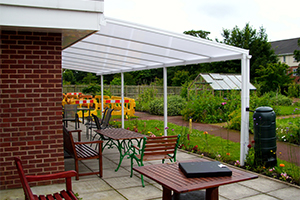Inspirational social care leader Zoë Fry has been awarded the Order of the British Empire (OBE) medal for services rendered to social…
5 Benefits of Outdoor Cover in Care Settings
With the summer in full swing and the recent pandemic situation, the need to spend time outdoors has never been so prevalent. We’ve therefore outlined five of the greatest benefits that a canopy brings to care settings when paired with a nature garden.
1. It’s Safer to Socialise Outside
Right now, it’s safer to spend time with others outside making your residents, staff and visitors feel much safer and at ease. The Centers for Disease Control and Prevention states that “Indoor spaces are more risky than outdoor spaces where it might be harder to keep people apart and there’s less ventilation.”
Correspondingly, spending time outside when the weather is pleasant seems to make the occasion more enjoyable for all involved. The sun has put a smile on everyone’s faces, particularly after being cooped up indoors all winter.

2. Nature Heals
It is well known that nature heals and spending time within nature can help patients to feel better in themselves. Over the years, several studies have found that something as simple as windows that look out into a natural outdoor area with trees, foliage and flowers, can improve attention span, reduce stress and even help hospital patients heal after surgery.
Alongside many other studies, Roger S. Ulrich, Ph.D. published a paper in 2002 titled Health Benefits of Gardens in Hospitals which stated that “simply looking at environments dominated by greenery, flowers, or water -- as compared to built-up scenes lacking nature (rooms, buildings, towns) -- is significantly more effective in promoting recovery or restoration from stress. (See Ulrich, 1999, for a survey of studies.) A limited amount of research suggests that viewing settings with plants or other nature for a few minutes can promote measurable restoration even in hospital patients who are acutely stressed.”
3. It’s Great for Our Mental Health
In relation to healing, spending time within nature is also known to be highly beneficial to our mental health. The mental health charity Mind explains: “Spending time in nature has been found to help with mental health problems including anxiety and depression. For example, research into ecotherapy (a type of formal treatment which involves doing activities outside in nature) has shown it can help with mild to moderate depression. This might be due to combining regular physical activity and social contact with being outside in nature.
Being outside in natural light can also be helpful if you experience seasonal affective disorder (SAD), a type of depression that affects people during particular seasons or times of the year. And people tell us that getting into nature has helped them with many other types of mental health problems.”
4. A Covered Outdoor Space Encourages Movement
For patients with limited mobility, they may be put off going outside by worrying that it may rain or be too hot and the effort to go outside won’t be worth it. However, if they have a canopy that they can sit under, without the need to rush indoors if it rains, they may be more inclined to venture outside and reap the benefits of the great outdoors. This will also keep them more physically active my moving about instead of staying seated indoors.
5. All-Year-Round Outdoor Protection
A canopy enables your nature garden to be used all year round as it provides protection from both the sun and rain, keeping you cooler in the hot, summer months by creating a cooling shade underneath the canopy. It also protects from the rain by providing a sheltered area where residents and staff can take time out to recharge sit outside with a beverage and listen to the calming sounds of the rain whilst keeping dry.
A canopy therefore gives your residents the chance to enjoy the healing benefits of nature throughout every month of the year.
If you are thinking of adding a canopy to your care home or healthcare setting, contact the canopy experts Able Canopies Ltd. on 0800 389 9072 or email sales@ablecanopies.co.uk you can also visit: www.ablecanopies.co.uk





